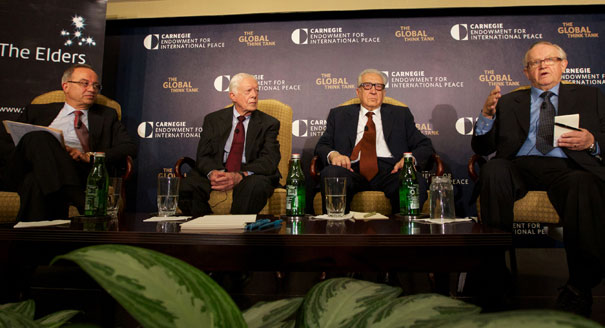Registration
You will receive an email confirming your registration.
Follow the conversation on Twitter using #EldersDC.
Twenty years after the Oslo Accords, the Middle East peace process is stalled. As U.S. Secretary of State John Kerry attempts to restart direct talks between Israelis and Palestinians, what needs to be done to save the two-state solution?
The Elders, a group of independent leaders founded by Nelson Mandela, discussed the Israeli-Palestinian conflict. Martti Ahtisaari, former president of Finland; Lakhdar Brahimi, special envoy to Syria and former foreign minister of Algeria; and Jimmy Carter, former president of the United States, discussed U.S. efforts, the Arab Peace Initiative, the role of the European Union, and the impact of regional events on the conflict. Marwan Muasher moderated.
Martti Ahtisaari
Martti Ahtisaari is the former president of Finland, a Nobel Peace Laureate, and an expert in international peace mediation, diplomacy, and post-conflict state building.
Lakhdar Brahimi
Lakhdar Brahimi is special envoy to Syria, former foreign minister of Algeria, and an expert in peacekeeping and post-conflict reconstruction.
Jimmy Carter
Jimmy Carter is the former president of the United States, a Nobel Peace Laureate, and a veteran peace negotiator.
Marwan Muasher
Marwan Muasher is vice president for studies at the Carnegie Endowment, where he oversees the Endowment’s research in Washington and Beirut on the Middle East.
